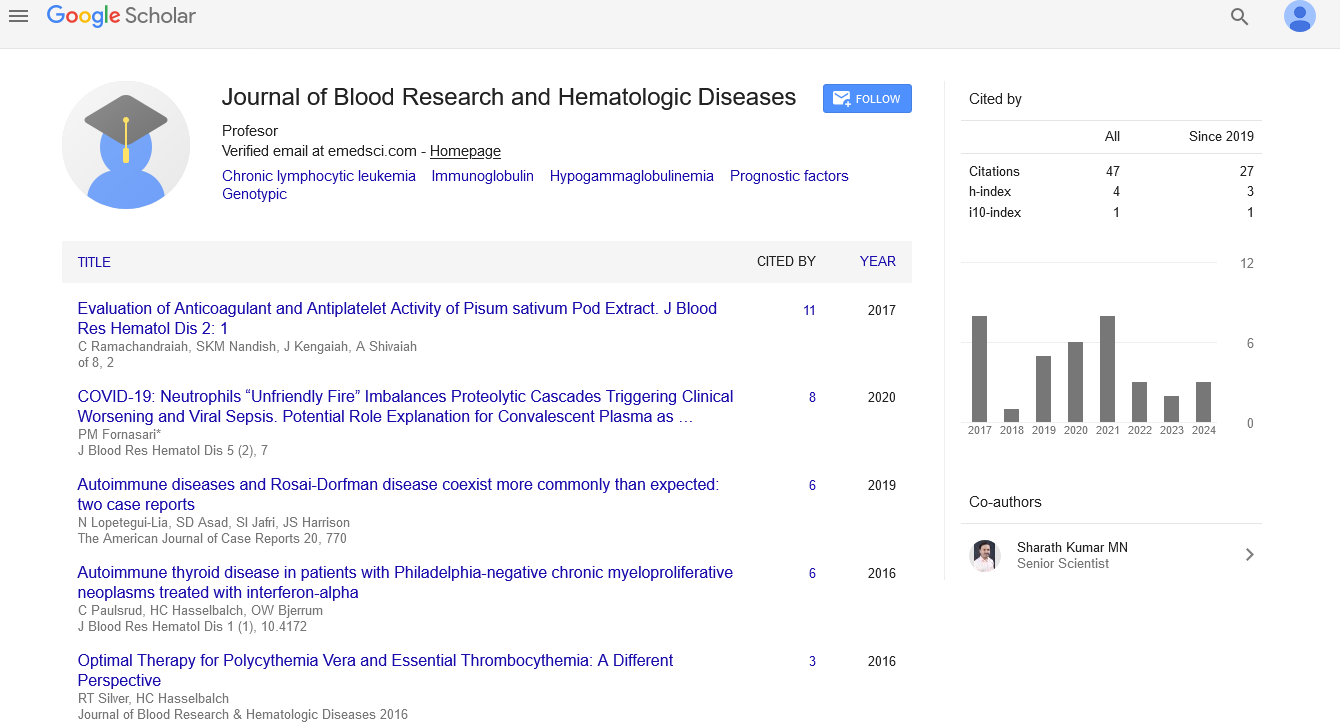Commentary, J Blood Res Hematol Dis Vol: 8 Issue: 1
Understanding Neutropenia and its Symptoms, Treatment and Prevention
David Chron*
Department of Hematology, Hammoud Hospital University Medical Center, Saida, Lebanon
*Corresponding Author: David Chron
Department of Hematology
Hammoud Hospital University Medical Center
Saida, Lebanon
E-mail: davidchron@yahoo.com
Received date: 03-Mar-2023, Manuscript No. JBRHD-23-95439;
Editor assigned date: 06-Mar-2023, PreQC No. JBRHD-23-95439 (PQ);
Reviewed date: 20-Mar-2023, QC No. JBRHD-23-95439;
Revised date: 27-Mar-2023, Manuscript No. JBRHD-23-95439 (R);
Published date: 06-Apr-2023, DOI: 10.4172/jbrhd.1000162.
Citation: Chron D (2023) Understanding Neutropenia and its Symptoms, Treatment and Prevention . J Blood Res Hematol Dis 8:1.
Description
White blood cells, also known as leukocytes, help the body fight illnesses and foreign intruders. Neutrophils are a type of white blood cell that plays an important function in protecting the body from bacterial and fungal diseases. Neutropenia occurs when the quantity of neutrophils in the blood falls below normal levels. Neutropenia can raise the risk of infections and other health issues. This study will go over the signs and management of neutropenia or decreased white blood cell counts. Neutropenia is characterized as having fewer neutrophils (a type of white blood cell) than normal. White blood cells are immune system components. Neutrophils, lymphocytes (including T and B lymphocytes), monocytes, and macrophages are all types of white blood cells that play vital roles in the body's defence against microorganisms. Neutropenia is a condition in which the blood level of neutrophils, a kind of white blood cell, is lower than usual. This can be the result of an infection, but it can also be the result of cancer treatment. It is critical to avoid infection. Immunosuppression refers to a compromised immune system.
Symptoms of neutropenia
Neutropenia symptoms might vary depending on the severity of the disorder. Some people with mild neutropenia may feel no symptoms at all, but others with severe neutropenia may develop life-threatening illnesses. Neutropenia is characterized by the following symptoms:
Fever: Fever is frequently experienced by neutropenic patients as a result of bacterial or fungal infections. The fever may be continuous or intermittent, and it may be accompanied by chills and sweating.
Painful throat: Because the throat is a common site of infection, a painful throat is a common symptom of neutropenia.
Mouth sores: Neutropenic individuals may develop severe mouth sores, making eating and drinking difficult.
Skin infections: Another common source of infection in neutropenic patients is the skin. Redness, swelling, and warmth are all symptoms of a skin infection.
Pneumonia: Neutropenic people are more likely to develop pneumonia, which can cause coughing, chest pain, and breathing difficulties.
Diarrhea: Diarrhea in neutropenic patients can be caused by infections or drugs.
Treatment of neutropenia
Neutropenia treatment is determined by the underlying cause of the ailment. If neutropenia is induced by chemotherapy or radiation therapy, treatment may entail lowering the dose or frequency of these treatments. If neutropenia is caused by an underlying medical disease, such as an autoimmune problem, treatment may include addressing that condition.
There are numerous medications available to assist avoid infections in neutropenic individuals, in addition to addressing the underlying cause of neutropenia. Among these treatments are:
• In neutropenic patients, antibiotics are widely used to prevent and cure bacterial infections. The antibiotic used will be determined by the type of infection being treated.
• Antifungal medicines can be used to prevent and treat fungal infections in neutropenic patients.
• G-CSF (Granulocyte Colony Stimulating Factor): G-CSF is a medicine that increases the formation of white blood cells such as neutrophils. It may be used to treat severe neutropenia or to avoid neutropenia in chemotherapy patients.
• Intravenous Immunoglobulin (IVIG) is a medicine derived from human plasma that contains antibodies that aid in the fight against infections. It has the potential to be used to prevent infections in neutropenic patients who have specific underlying medical disorders.
Preventing infections in neutropenic patients
Neutropenic people are more likely to get infections, so it is critical to take precautions to avoid infection. Here are some infectionprevention tips for neutropenic patients.
• Maintain proper hand hygiene, hands should be washed with soap and water on a regular basis, especially before eating or preparing food.
• Neutropenic patients should avoid large crowds since they are more susceptible to infection.
• Neutropenic patients should avoid contact with sick people, particularly those with respiratory or gastrointestinal infections.
 Spanish
Spanish  Chinese
Chinese  Russian
Russian  German
German  French
French  Japanese
Japanese  Portuguese
Portuguese  Hindi
Hindi 